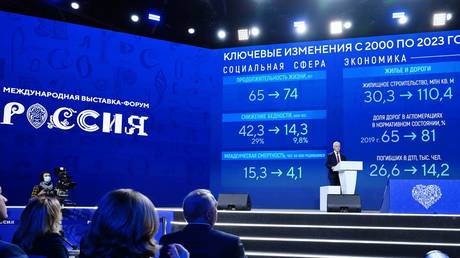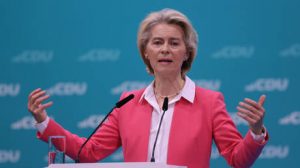
Russia to undergo economic transition – deputy PM
Major changes aim to boost GDP by 2030, Andrey Belousov has said
Russia has worked out a plan to transform the country’s economy by 2030, acting First Deputy Prime Minister Andrey Belousov said on Wednesday.
Speaking at a panel session at the international exhibition-forum ‘Russia’ called ‘Efficient and competitive economy’, Belousov laid out the roadmap for implementing the long-term economic strategy announced by President Vladimir Putin earlier in the day. The key, according to him, will be a transition from a demand-driven economy to a supply-driven one.
“We need to create conditions in which the growth impulse will not be external, from monetary demand, but come from the production sector itself,” Belousov told the panel.
Among the ways to achieve this are to introduce labor reforms, entrepreneurial incentives, increase efficiency and productivity – including through automation – and harness artificial intelligence, he explained.
Read more
Putin updates Russia’s national development goals
Consumer spending – based on increased productivity and real wages – combined with capital investments and oil and gas exports will account for about 16% of the increase in Russia’s GDP, Belousov said. The IT and communications industries are regarded as the biggest engines of growth, which the government aims to see expand by 130% by the end of the decade.
Belousov’s roadmap for economic transition involves extensive reforms aimed at improving productivity, including via automation and education, boosting investments, increasing exports other than natural resources and energy, and creating transportation corridors for Russian goods, which should be able to carry 1.4 billion tons of cargo by 2030.
Wednesday’s session also discussed the role of the federal and regional authorities in improving the investment climate and business activity in the country, as well as the removal of transportation restrictions while preserving Russia’s “logistical sovereignty.”
Read more
The specific goals set by Putin include Russia having the fourth-highest GDP – measured by purchasing power parity – in the world by 2030, thus surpassing Japan. Russia would also be among the top 25 countries for using robots in manufacturing and in the top ten in terms of scientific research and development.
The underlying intention of the transformation is to ensure Russia’s position as a sovereign nation that respects traditional values, engages with friendly nations, and improves its economic standing through science and private entrepreneurship, according to the president’s decree.


